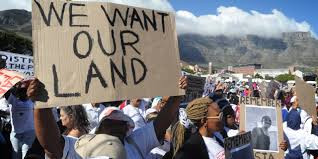
THE dawn of independence across former settler States in southern Africa raised hopes for restive populations who envisaged a fast-tracked land reform. For the many disenfranchised indigenes, land as the abode of all natural resources was and remains a vital yardstick of true liberation. However, their hopes were dashed because the agreed transitions to independence mainly in South Africa and Zimbabwe, bequeathed a snail-paced land redistribution exercise under the market-driven “willing buyer willing seller” principle.
As a result, the post-independence widening of socio-political and economic inequalities radicalised nationalist sentiment fuelling demands to redress what has been referred to as constitutional injustices. Beginning with Zimbabwe at the turn of the millennium followed by South Africa over the past decade, the issue of land redistribution became a frontier of conflict.
Despite their historical grounding and moral density, calls for redistribution of land, as was with Zimbabwe, have always attracted an imperial backlash. True to the foregoing, on February 2, 2025, United States President Donald Trump threatened to halt aid funding to South Africa. Trump alleged that the South African government was arbitrarily confiscating land and treating certain classes badly “doing terrible things, very horrible things”.
While the statement represented a maximum of meanings and a minimum of signs, the alleged victims referred to are “whites” who because of generational wealth had benefited from apartheid’s warped socio-economic policies.
To many, Trump’s announcement was a veiled response to the Expropriation Act passed by the South African government to address the unequal legacy of apartheid regarding the access, control and ownership of land.
To be read in tandem with section 25 of the South African Constitution, the Act will expropriate land in specific situations where it is not being utilised productively or where it would be in the public good to have it redistributed.
Across the political divide in South Africa, Trump’s announcement has been dismissed, with the Democratic Alliance refuting the alleged expropriation without compensation and the firebrand Julius Malema of the Economic Freedom Fighters dismissing everything as offensive and imperialistic.
In reality, Trump’s statement represents an apprehensive and petrified “white capital” that is unsettled by the prospect of losing its entrenched wealth and privileges, born out of and inherited from apartheid.
- South Africa’s Expropriation Act: Reflections on the Empire and the transnational legacy of land in southern Africa
Keep Reading
It may be tempting to believe that Trump misinterpreted the Act or was ill-advised, especially by his close confidante, Elon Musk, who holds prejudices about South Africa’s land policy. On the contrary, he did not. The statement is a direct scare tactic to the South African government to think twice and never entertain the idea of land expropriation. Lest South Africa becomes another Zimbabwe, a country that has been held on the leash for over two decades for daring to challenge the global capitalist system by redistributing land to its black population.
It remains to be seen whether South Africa’s constitutional democracy, through its protected consultation and the veto gauntlet, “may” prevent wholesale land expropriation without compensation.
However, as with the regrettable Zimbabwean case, a continued obstinate refusal by “whites” to de-centre and divest themselves of privilege may push the country to the brink. It is gospel truth that colonial history was co-produced between the colonised and the coloniser and the memory has never been collectively remembered.
However, while destruction and assemblage have their assured costs, as Zimbabwe’s fast-tracked land redistribution showed, such sustained colonial denialism, amnesia and hubris by white South Africans in cahoots with imperial forces will undercut the “rainbow nation” spirit, pushing the country to the precipice.
Besides, the colonial history of, pillage, plunder and native disenfranchisement makes land redistribution an emotionally-charged issue. Despite having their inertia, peculiarities and specificities; the colonial memory of the Empire’s perfidy, land grabbing and post-independence socio-economic inequalities are equally shared across the region.
Hence, the redress of colonial legacies has traction striking a transnational chord across post-settler economies in southern Africa.
Given the diplomatic tiff between South Africa and the United States, which has also seen Marco Rubio, the US Secretary of State, announcing that he will skip the G20 foreign ministers meeting to be held in Johannesburg from 20 to 21 February 2025, the question is: Are we witnessing history repeating itself? Is the world witnessing a repeat of the diplomatic showdown between Harare and London over Zimbabwe’s stance to redistribute land?
Without hard pressing the Zimbabwean case on this discussion, maybe the time is right to accept that Zimbabwe’s land redistribution, despite its internal shortcomings and excesses, which starkly serve as lessons, has aroused regional consciousness by providing the signposts towards economic emancipation and empowerment.
So, far from being a capricious act of political expediency, the location of Zimbabwe’s land redistribution within the broader fight against the Empire and its neo-colonial matrices of power, which for so long has handicapped regional progress, should be engraved as the decalogue.
While the costs of being a bellwether against the Empire in the region have meant that Zimbabwe became a living example of the hazards of sovereign assertiveness, by now countries like South Africa should have learnt how to navigate such an intricate but inevitable exercise.










